
Skunks, known for their distinctive black and white appearance, have a defense mechanism that is both effective and notorious: their spray. But what does skunk spray look like? In this comprehensive article, we delve into the details of skunk spray, its appearance, composition, and effects. This information is crucial for anyone living in areas where skunks are common, as it can help in identifying and dealing with skunk encounters.
Skunk spray is a yellowish, oily liquid that is secreted from glands located near the base of the skunk's tail. When sprayed, it can appear as a fine mist or stream, depending on the skunk's aim and the distance from the target. The spray contains sulfur-based compounds called thiols, which are responsible for its potent and long-lasting odor. The consistency of the spray allows it to cling to fur, clothing, and even skin, making it particularly challenging to remove. Understanding the visual and chemical characteristics of skunk spray can aid in immediate response and effective cleanup, mitigating its unpleasant effects.
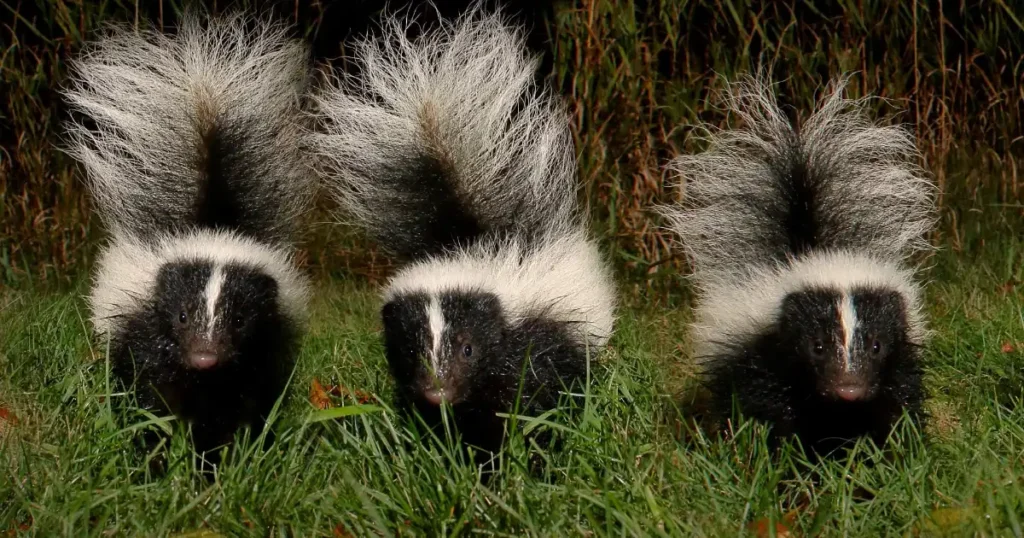
The anal glands of skunks produce a liquid known as skunk spray or skunk musk. These glands are located on either side of the anus and can emit the spray with remarkable accuracy, reaching distances of up to 10 feet. The primary function of this spray is to deter predators and threats. The spray is composed of sulfur-containing chemicals called thiols, which are responsible for its potent and lingering odor.
Color and Consistency Skunk spray is generally a yellowish or oily liquid. The exact shade can vary slightly, but it often appears as a pale yellow. The consistency is somewhat viscous, akin to that of motor oil, allowing it to adhere to surfaces and fur effectively. This oily nature contributes to the difficulty in removing the odor once it has made contact.
Visibility In low quantities, skunk spray may not be immediately visible, especially on darker surfaces or fur. However, when a significant amount is sprayed, the yellowish tint can become noticeable. On lighter surfaces or fur, the spray might leave a more discernible stain, indicating the areas affected.
Chemical Components The primary components of skunk spray are thiols, specifically butyl mercaptan and methyl mercaptan. These compounds are organic sulfur compounds known for their strong, unpleasant odors. In addition to thiols, skunk spray contains thioacetates, which can slowly release thiols over time, prolonging the odor.
Why It Smells So Bad Thiols are particularly volatile, meaning they easily evaporate and disperse into the air. This property allows the odor to travel over long distances. The human nose is incredibly sensitive to thiols, even at very low concentrations, making skunk spray an exceptionally effective deterrent.
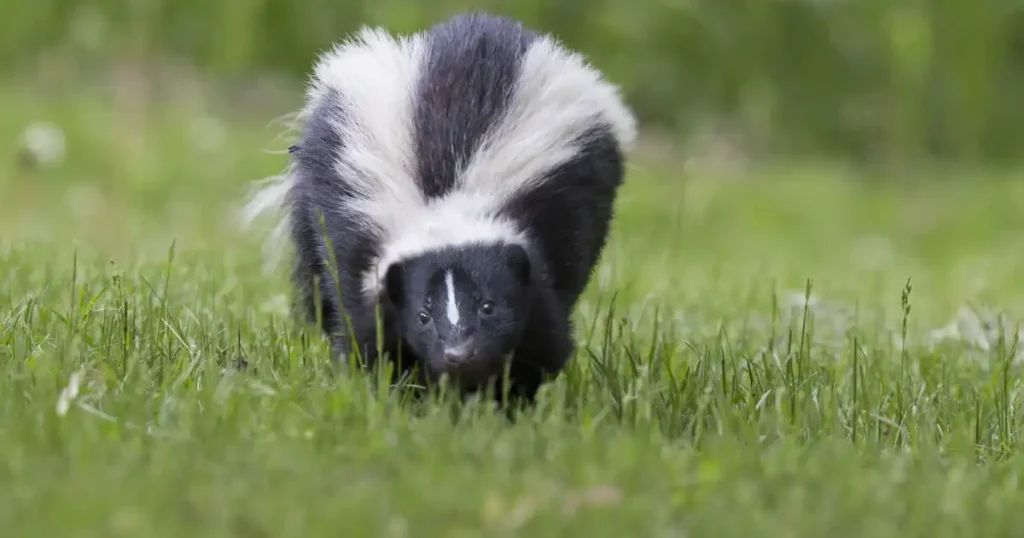
On Humans Exposure to skunk spray can cause nausea, vomiting, and eye irritation. The smell is overwhelming and can persist for days or even weeks if not properly treated. Direct contact with the spray can lead to temporary blindness due to the irritant nature of the chemicals.
On Animals For other animals, the effects of skunk spray can be equally distressing. Predators that have been sprayed often learn to avoid skunks in the future. Pets, particularly dogs, are common victims and may suffer from the same symptoms as humans, including eye irritation and nausea.
Mechanism of Spraying Skunks are equipped with specialized muscles that allow them to control the direction and amount of spray released. When threatened, a skunk will typically give several warning signs before spraying, such as stomping its feet, raising its tail, and hissing. If these warnings are ignored, the skunk will bend its body into a U-shape, with its head and tail pointing towards the threat, and then release the spray.
Accuracy and Distance Skunks are remarkably accurate when spraying, capable of hitting targets with precision up to 10 feet away. This accuracy is crucial for their defense, as it ensures that predators are deterred without the skunk needing to come into close contact with the threat.
Immediate Actions If you or your pet has been sprayed by a skunk, it's important to act quickly. Avoid bringing the affected individual indoors to prevent the odor from spreading. For pets, keep them outside and use a de-skunking solution made from hydrogen peroxide, baking soda, and liquid dish soap. For humans, thoroughly washing with soap and water can help, though it may take several attempts to fully remove the smell.
Long-term Odor Removal Removing skunk odor from clothing, furniture, or other belongings can be challenging. Professional cleaning services may be necessary for items that cannot be washed in a regular machine. For washable items, soaking them in a solution of vinegar and water before laundering can help reduce the odor.
Preventive Measures To minimize the risk of skunk encounters, secure garbage cans, eliminate food sources, and seal entry points to sheds or under porches. Using motion-activated lights or sprinklers can also deter skunks from frequenting your property.
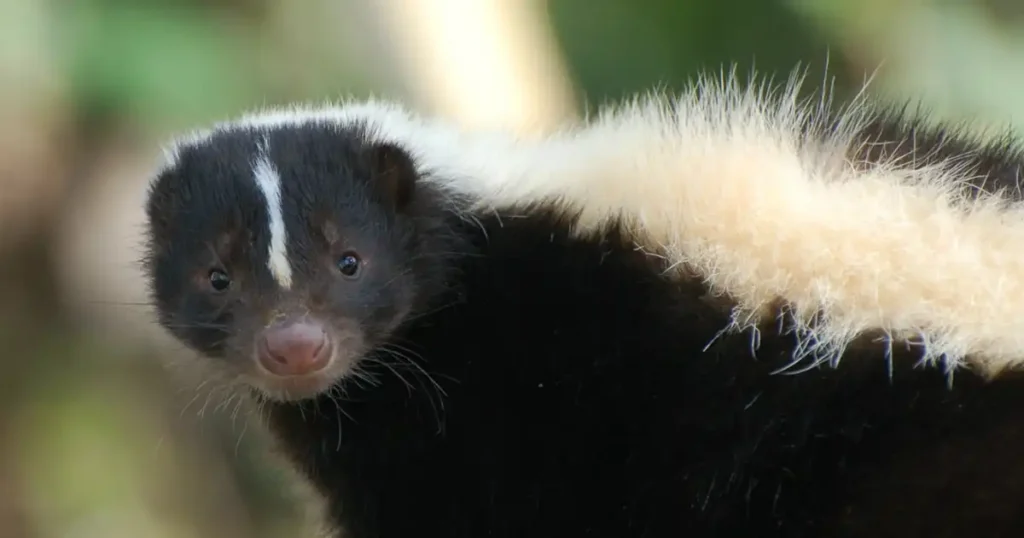
Tomato Juice One common myth is that bathing in tomato juice will eliminate skunk odor. While it might help mask the smell temporarily, it does not neutralize the thiols responsible for the odor.
Immediate Danger Another misconception is that skunk spray is immediately dangerous. While it is certainly unpleasant and can cause discomfort, it is not typically harmful in the long term unless it gets into the eyes or is inhaled in large quantities.
Health Implications While the immediate effects of skunk spray are primarily discomforting, the long-term health implications can vary. Prolonged exposure to skunk spray, particularly in enclosed spaces, can lead to respiratory issues due to the high concentration of sulfur compounds. In rare cases, repeated exposure can result in sensitization, where individuals develop an allergic reaction to the chemicals in the spray. Real skunk spray can cause nausea, vomiting, and temporary blindness if it gets into the eyes.
Environmental Effects Skunk spray can have a notable impact on the local environment. The strong odor can disrupt the behavior of wildlife, potentially deterring other animals from entering the area. Additionally, the thiols in the spray can linger in soil and water sources, affecting the ecosystem. However, these effects are generally localized and diminish over time as the compounds break down.
Safety First When encountering a skunk, it’s important to stay calm and avoid sudden movements. Skunks will typically give warning signs before spraying. If you see a skunk stomping its feet, raising its tail, or hissing, back away slowly and give it space to escape.
Professional Help In areas with high skunk activity, it might be wise to consult with wildlife control professionals like Critter Stop. They provide high-quality, humane wildlife removal services and have an excellent reputation for customer service. Critter Stop can offer advice on making your property less attractive to skunks and safely remove any that have taken up residence.
Home Remedies For surfaces affected by skunk spray, a mixture of vinegar and water can help neutralize the odor. For more persistent smells, a commercial odor neutralizer designed for skunk spray may be necessary. It’s important to avoid using bleach or ammonia-based cleaners, as these can react with the thiols and worsen the smell.
Clothing and Fabrics Clothing and fabrics that have been sprayed should be washed in the hottest water safe for the material with a heavy-duty detergent. Adding baking soda or vinegar to the wash cycle can help break down the thiols. It may take several washes to fully remove the odor.
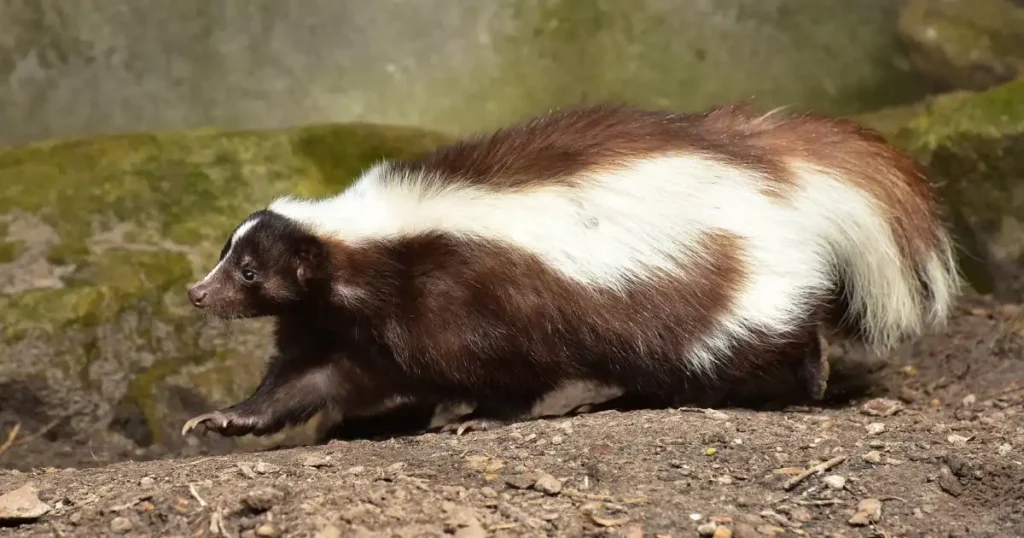
Skunk Species There are several species of skunks, including the striped skunk, spotted skunk, hooded skunk, and hog-nosed skunk. Each species has its unique characteristics, but all share the ability to spray as a defense mechanism.
Diet and Behavior Skunks are omnivores and their diet includes insects, small mammals, birds, fruits, and plants. They are primarily nocturnal and have poor eyesight, relying on their sense of smell and hearing to navigate and find food.
Skunk Lifespan In the wild, skunks have a lifespan of about 2-4 years, although they can live longer in captivity. Their primary predators include great horned owls, coyotes, foxes, and bobcats. Despite their potent spray, skunks are still vulnerable to these natural predators.
Secure Food Sources One of the most effective ways to prevent skunk problems is to eliminate food sources. This includes securing trash cans with tight-fitting lids, feeding pets indoors, and removing bird feeders that might attract skunks.
Yard Maintenance Keeping your yard clean and free of debris can also help. Skunks are attracted to overgrown areas, piles of wood or rocks, and other clutter that can provide shelter. Regularly mowing the lawn, trimming bushes, and clearing away clutter can make your property less inviting to skunks.
Fencing and Barriers Installing fences or barriers can deter skunks from entering your property. Ensure that fences are buried at least a foot underground to prevent skunks from digging under them. Using mesh or hardware cloth can provide an additional layer of protection.
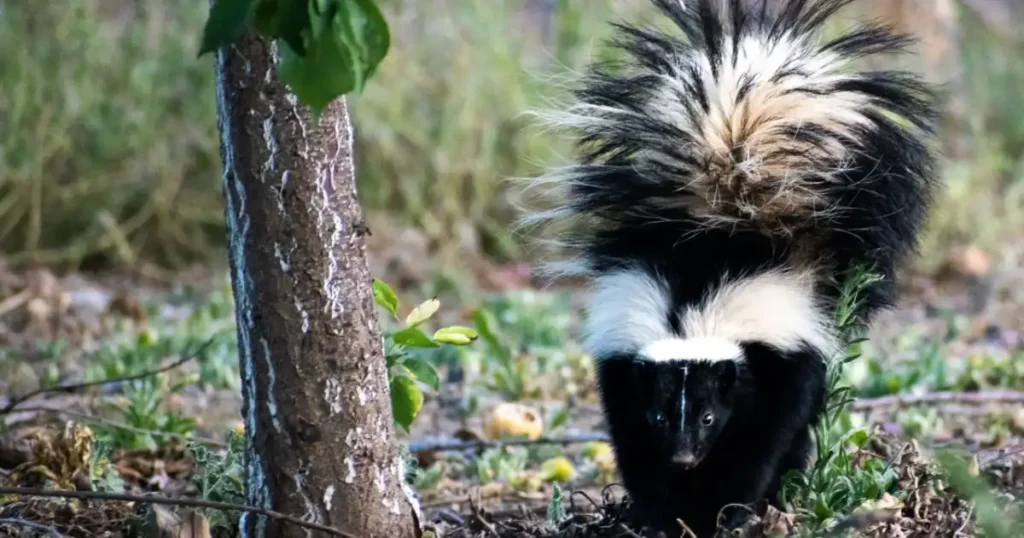
Literature and Media Skunks and their spray have been featured in various forms of literature and media. The character Pepe Le Pew from Looney Tunes is a famous example, known for his persistent pursuit of love despite his overwhelming odor. Skunks have also appeared in children’s books, movies, and even as mascots for sports teams.
Folklore and Symbolism In some cultures, skunks are seen as symbols of self-respect and assertiveness. Their ability to defend themselves effectively despite their small size is admired and often used metaphorically in stories and teachings.
Does Skunk Spray Smell Like Onions? Skunk spray has a potent odor often compared to burnt rubber, rotten eggs, garlic, and sometimes onions due to its sulfur compounds.
How Long Does Skunk Spray Last Outside? The odor of skunk spray can last for several days to weeks outside, depending on weather conditions and exposure to elements.
How to Avoid Getting Sprayed by a Skunk? To avoid getting sprayed, recognize warning signs like stomping, hissing, and raised tails. Back away slowly and give the skunk space to escape.
How to Keep a Skunk From Spraying? Minimize threats by avoiding direct eye contact, moving away slowly, and eliminating food sources around your property.
How to Not Get Sprayed by a Skunk? Be aware of your surroundings, keep pets leashed, secure trash cans, and install outdoor lighting or motion-activated sprinklers.
Understanding the nature of skunk spray, from its appearance to its effects, is crucial for dealing with skunk encounters effectively. Recognizing the yellowish, oily liquid and knowing how to respond can make a significant difference in mitigating the effects of a skunk encounter. By taking preventive measures, acting quickly when necessary, and debunking common myths, you can minimize the impact of skunks on your life. For those in need of professional help, Critter Stop offers high-quality, humane wildlife removal services with a fantastic reputation and excellent customer reviews. Their expertise can ensure that your property remains skunk-free and safe.
If a skunk is causing problems, such as spraying near your home or digging up your yard, there are humane ways to address the issue. At Critter Stop, we have provided our skunk removal services for years in the North Texas area, helping customers to protect their family, pets, and property from skunk-related issues.
Contact us at (214) 234-2616 to get a free estimate of our services.
Visit our Critter Library and learn more about our furry friends